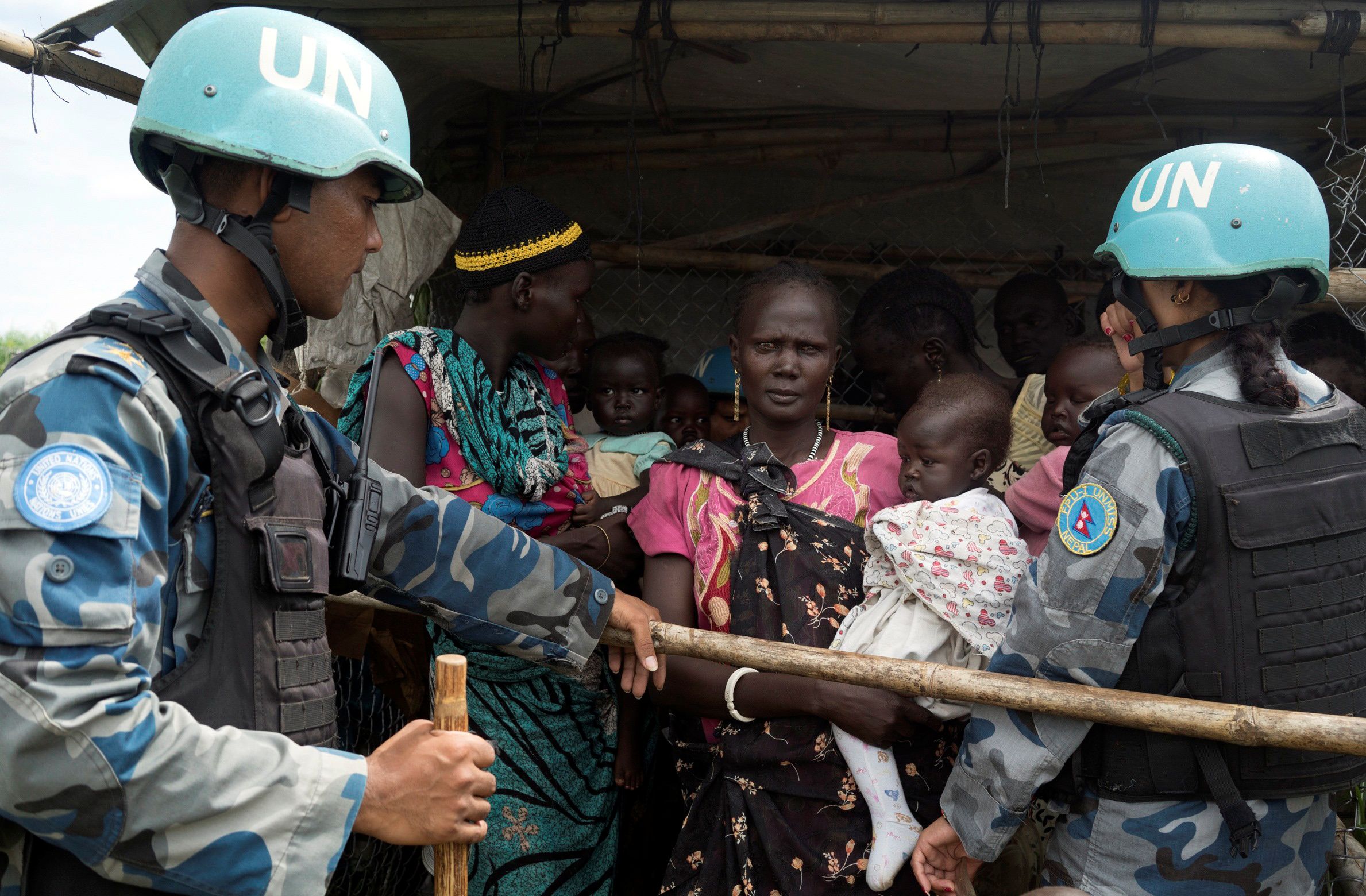
On the morning of July 21, three women left a United Nations base on the outskirts of Juba, the capital of South Sudan, to buy food for their children. They are among thousands of people taking shelter in U.N. bases because of the country's on-again, off-again conflict.
They had heard stories of soldiers from the South Sudanese army raping women as they came back from similar shopping trips, so they hoped to return early enough to avoid trouble. But as they walked back from the market around noon, a group of uniformed soldiers with guns and knives stopped the women, beat them with rifle butts, seized their food and phones, and took them to a nearby walled compound.
"When we reached the compound, they beat us again," Nyabol*, one of the women, told me. "[There were] many men inside. They raped us there…in the compound, in front of everybody."
Mary*, Nyabol's friend who accompanied her to meet me, was several months pregnant. But that didn't stop the soldiers raping her too, she told me.
The South Sudanese government's response to violent assaults on women and girls since the fighting began has been deeply flawed, leaving little hope that the attackers will be punished. The very day a ceasefire was announced in the latest round of fighting, on July 11, the authorities knew that government soldiers had attacked the Terrain compound, which housed about 50 international organization staff. The soldiers executed a journalist and raped and gang-raped several female staff. Terrified staff inside the compound repeatedly called for help, but national security officers only arrived several hours later.
Though the government knew what was happening, sexual assaults in Juba continued for at least two weeks. U.N. peacekeepers did not live up to their mandate to protect civilians either. Staff inside the Terrain compound also called the U.N. when under attack, but peacekeepers did not respond. On July 17, soldiers dragged a woman away within the line of sight of U.N. peacekeepers, who did nothing.
When I met Chief of Military Justice Henry Oyay at his office in the Bilpham army headquarters in Juba on July 21, he told me the army had formed a court martial to deal with soldiers who committed crimes during and after the fighting. But when I asked Oyay about rapes by government soldiers around the U.N. camps, he told me: "These are isolated incidents."
In fact, the incidents were neither isolated nor difficult to find. On August 4, the U.N. High Commissioner for Human Rights, Zeid Ra'ad al-Hussein, announced that the U.N. had documented 217 cases of sexual violence against women and girls in Juba between July 8—when the latest round of fighting broke out —and July 25, long after hostilities officially ceased. Government soldiers carried out most of the rapes and gang rapes, al-Hussein said, and the victims were primarily Nuer—the ethnicity of opposition leader Riek Machar and many of his supporters—though women and girls from other minority tribes were also targeted.
More than 100 of the incidents the U.N. documented took place on a single stretch of Yei Road, which leads to the U.N. base where civilians were taking shelter on the outskirts of Juba. This stretch of road is clearly under military control and within a few minutes' drive of the army's central command.
Responding to U.N. reports of rape, military spokesman Lul Ruai Koang asked: "Why are they [the U.N.] not coming forward with the evidence they have collected for us to act? We need this evidence to be given to us that our men in uniform took part in the alleged crimes in order for us to bring charges against them."
But that self-serving answer cannot satisfy the military's clear legal obligations to investigate and hold its officers to account for rape, as well as other crimes. So far, the court martial has charged 24 soldiers for looting or indiscriminate shooting. The military, however, has not referred a single soldier to civilian courts for rape.
On August 15, following intense media scrutiny of the Terrain compound attack, President Salva Kiir finally announced that the government had launched an investigation into sexual assault cases. Such an investigation should seek not only to identify attackers, but their commanding officers as well. Commanders who knew, or had reason to know, that their subordinates were committing crimes such as rape and did not take all necessary and reasonable measures in their power to prevent the crimes, or fail to punish those who committed them, are themselves responsible for war crimes.
In addition, South Sudan's leaders should prove their commitment to justice and accountability by reaching out to the African Union Commission—tasked with setting up a hybrid court to try the most serious crimes—to establish the tribunal without delay. Human Rights Watch research on the justice system in South Sudan underscored serious obstacles to fair, credible cases involving the most serious crimes, including widespread rape. Recent events only emphasize how urgently this court is needed. Mary, Nyabol and thousands of other survivors deserve justice to its fullest degree.
Priyanka Motaparthy is a senior emergencies researcher at Human Rights Watch.
*The real names of the interviewees have not been used to protect their identities.
Uncommon Knowledge
Newsweek is committed to challenging conventional wisdom and finding connections in the search for common ground.
Newsweek is committed to challenging conventional wisdom and finding connections in the search for common ground.
About the writer
To read how Newsweek uses AI as a newsroom tool, Click here.








